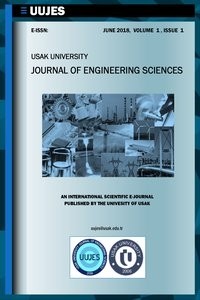DESIGN OF EXPERIMENT FOR ETHANOL USING STATISTICAL ANALYSIS FOR MANUFACTURING OF METHYLATED SPIRIT
DESIGN OF EXPERIMENT FOR ETHANOL USING STATISTICAL ANALYSIS FOR MANUFACTURING OF METHYLATED SPIRIT
Methylated Spirit, Fermentation Distillates, Alcohol, Statistical model,
___
- [1] Ward OP, Singh A. Bioethanol technology: developments and perspectives, Advs in App Micr 2002; 51: 53-80.
- [2] Oyeleke SB, Dauda BN, Oyewole OA, Okoliegbe IN, Ojebode T. Production of Bioethanol from Cassava and Sweet Potato Peels, Advs in Env Bio 2012; 6(1): 241-245.
- [3] Itelima J, Onwuliri F, Onwuliri E, Onyimba I, Oforji S. (2013) Bio-ethanol Production from Banana, Plantain and Pineapple Peels by Simultaneous Saccharification and Fermentation Process, Int J of Env Sci & Dev 2013; 4(2): 213-216.
- [4] Almodares A, Hadi MR. (2009) Production of bioethanol from sweet sorghum: A review, Af J of Ag Res 2009; 4(9): 772-780.
- [5] Taouda H, Chabir R, Aarab L, Miyah Y, Errachidi F. (2017) Biomass and bio-ethanol production from date extract, J of Mtl and Env Sci 2017; 8(9): 3093-3098.
- [6] Akpan UG, Kovo AS, Abdullahi M, Ijah JJ. The Production of Ethanol from Maize Cobs and Groundnut Shells, AU J T 2005; 9(2): 106-110.
- [7] Joshi B, Bhatt MR, Sharma D, Joshi J, Malla R, Sreerama L. Lignocellulosic Ethanol Production: Current Practices and Resent Developments, Biotechnol & Mol Bio Rev 2011; 6(8): 172-182.
- [8] Obahiagbon FI. A Review of the Origin, Morphology, Cultivation, Economic Products, Health and Physiological Implications of Raphia Palm, Af J of Food Sci 2009; 3(13): 447-453.
- [9] Obahiagbon FI. (2012) A Review: Aspect of the African oil palm (Elaeis guineesis jacq) and the Implication of its Bioactives in Human Health, Amer J of Bioc & Mol Bio 2012; 2(3): 106-119.
- [10] Karamoko D, Toka DM, Moroh J, Kouame KA, Koffi MD. HPLC Determination of Organic Acids in Palm Saps through Tapping Process, Int J of Innovative & App S 2016; 17(1): 245-254.
- [11] Akinrotoye KP. Effects of Fermented Palm Wine on some Diarrhoeagenic Bacteria, Elite Res J of Biotechnol & Micr 2014; 2(1): 4-14.
- [12] Santiago-Urbina JA, Rui’z-Teran F. Microbiology and Biochemistry of Traditional Palm Wine Produced around the World, Int Food Res J 2014; 21(4): 1261-1269.
- [13] Ukpaka CP, Farrow TS. (2015) Investigating the yield of Ethanol Using Palm wine in CSTR Connected in Series, Amer J of Sci Advs 2015; 1(1): 1-9.
- [14] Nguyen DV, Rabemanolontsoa H, Saka S. Sap from Various Palms as a Renewable Energy Source for Bioethanol Production, Kyoto University, Kyoto 606-8501, Japan, 2016.
- [15] Ukpaka CP. Ethanol is applied greatly in drinks, Pharmaceuticals, Cosmetics solving. Biodegradation Kinetics for the production of Carbon dioxide from natural aquatic Ecosystem polluted with Crude oil, J of Sci & Tech Res 2005; 4(3): 41-50.
- [16] Simon W, Harvinder SS, Mark IN, Ajay KR. (2010) Analysis of a Model for Ethanol Production through Continuous Fermentation: Ethanol Productivity, Int J of Chem Reac Eng 2010; 8: 1-17.
- Başlangıç: 2018
- Yayıncı: Uşak Üniversitesi
DESIGN OF EXPERIMENT FOR ETHANOL USING STATISTICAL ANALYSIS FOR MANUFACTURING OF METHYLATED SPIRIT
Aniekan IKPE, Azum ADOH, Ekom ETUK
Characterization and Properties Comparison of Nigerian Crab-shell Extracts
Chıosa ODILI, Olatunde SEKUNOWO, Philip GBENEBOUR, Olorupo ADEOSUN
